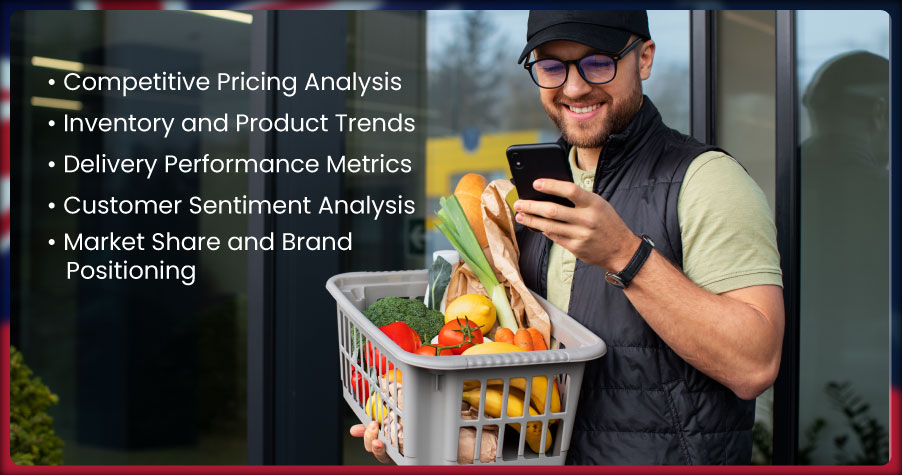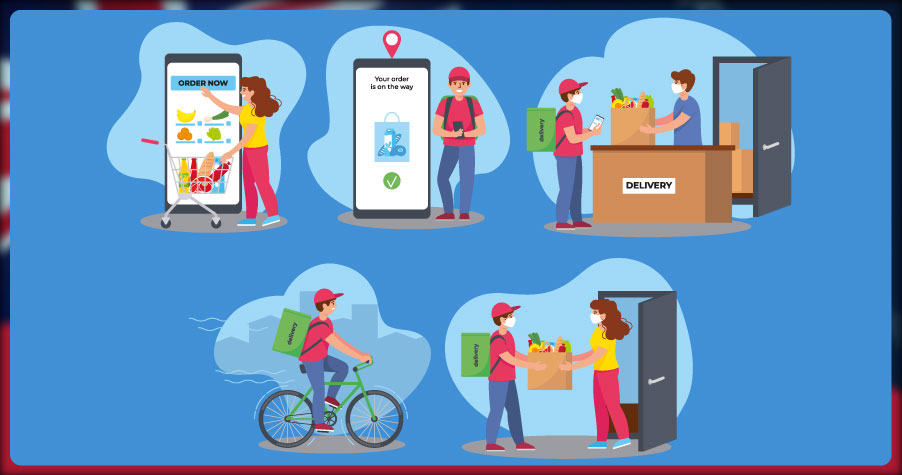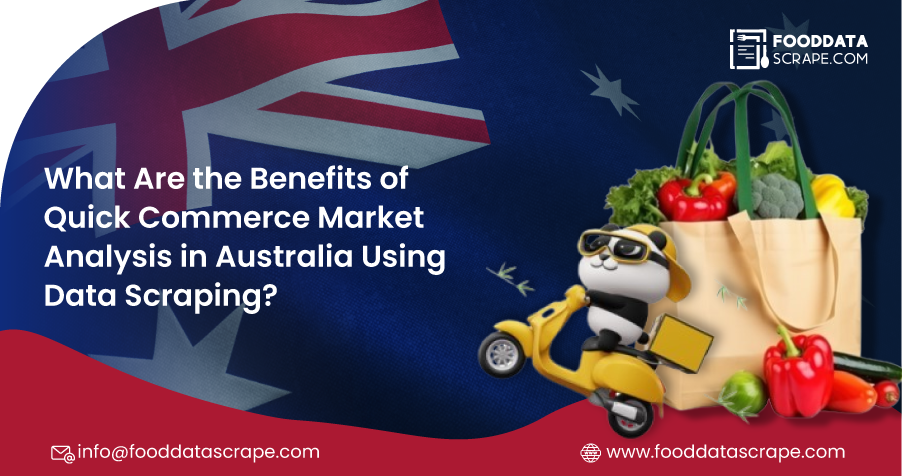The Quick Commerce Industry Analysis in Australia is continuously booming owing to the changing preferences of consumers and technological innovations. Quick commerce or q- commerce can be defined as grocery, household essentials, and ready-to-eat meals delivered at ultra-fast speeds. This sector relies upon digital platforms, mobile applications, and AI-based logistics. Its key players are Uber Eats, Doordash, Menulog, Milkrun, and Voly. Through Quick Commerce Market Analysis in Australia using Data Scraping, businesses can begin to understand the behavior of customers along with the dynamics at play with the market concerning pricing strategies, inventory management, and how it would perform in terms of customer experience by gaining large volumes of real-time data. Web Scraping for Quick Commerce Data in Australia is emerging as a new need for businesses to stay in the game of fast-changing q-commerce in Australia.
The Growth and Dynamics of Quick Commerce in Australia

Within the last two years, the quick commerce industry in Australia has grown remarkably because of the demands for convenience, increased urbanization, and a rise in digital payment systems. The pandemic from COVID-19 pushed the adoption of q-commerce as it encouraged consumers to rely more on home delivery services than ever before. Companies have invested in dark stores, automated warehouses, and order management systems with AI. Highly competitive, with all players competing primarily on pricing, delivery speed, and product variety, the industry requires real-time insights and historical data to navigate it. Quick Commerce Data Extraction Services in Australia offer companies the most critical market and customer preferences insights. Extract Quick Commerce Data in Australia for Market Trends to help businesses change their strategy, increase the efficiency of operations, and continue to lead the pack in this rapidly evolving q-commerce market.
How Data Scraping Powers Quick Commerce Analysis?

Data scraping involves collecting large volumes of structured and unstructured data from various sources, such as e-commerce websites, delivery apps, and customer reviews. Scraping data from platforms like Uber Eats, Doordash, and local competitors provides businesses with actionable intelligence in the quick commerce sector.
- Competitive Pricing Analysis: Pricing within the quick commerce (q-commerce) industry is highly volatile, often fluctuating due to factors such as demand, supply chain constraints, and the pricing strategies of competitors. To remain competitive, businesses must stay on top of these price changes. Data scraping plays a vital role by tracking real- time price fluctuations across platforms, enabling businesses to adjust their prices dynamically. With insights into price trends, companies can anticipate shifts in the market and plan effective promotional strategies to attract more customers, ensuring they maintain profitability while being competitive in the market.
- Inventory and Product Trends: In the fast-paced q-commerce industry, understanding inventory levels and product availability is crucial for meeting customer demands. Web scraping allows businesses to track stock levels across various platforms, helping them identify best-selling items and avoid out-of-stock situations. Additionally, by scraping data on seasonal demand shifts, businesses can anticipate trends and optimize their inventory accordingly. Web scraping also assists in identifying consumer preferences, providing valuable data to introduce new products that align with market demand, and ensuring businesses always offer what customers want.
- Delivery Performance Metrics: The speed of delivery is a defining feature of quick commerce, and businesses must constantly assess their delivery performance to remain competitive. Scraping delivery time estimates from various platforms enables companies to evaluate their service efficiency and compare it against competitors. Businesses can pinpoint areas where operational improvements are needed by analyzing key delivery metrics, such as delivery windows, rider availability, and logistical efficiencies. This data allows for optimizing delivery networks, ensuring quicker and more reliable customer service, and enhancing brand loyalty and customer satisfaction.
- Customer Sentiment Analysis: Understanding customer sentiment is key to improving services. User reviews and ratings provide valuable feedback on satisfaction and pain points. Scraping reviews from various platforms offers a clear picture of brand perception. Sentiment analysis tools identify patterns, highlighting common issues or positive experiences to guide decisions. This data helps businesses proactively address concerns and improve offerings. Using a Grocery Price Tracking Dashboard can also offer insights into how pricing influences customer sentiment, helping optimize pricing strategies.
- Market Share and Brand Positioning: Understanding market share and positioning is essential in a competitive q-commerce market. Scraping data on brand presence across platforms helps assess market penetration. Analyzing order volumes, promotions, and merchant listings reveals a brand’s share. This data enables businesses to benchmark performance and adjust growth strategies. Leveraging Grocery Pricing Data Intelligence allows businesses to track pricing trends and adapt to market shifts, ensuring better positioning and competitive advantage.
Gain Competitive Edge with Quick Commerce Data Scraping. Unlock the Power of Real-Time Insights!
Challenges in Data Scraping for Quick Commerce

While data scraping offers immense benefits, it also comes with challenges and ethical considerations:
1. Website Restrictions and Anti-Scraping Measures
- Many platforms implement CAPTCHAs, bot detection algorithms, and legal terms restricting automated data extraction.
- Businesses must use ethical scraping techniques and comply with legal regulations to avoid issues.
2. Data Accuracy and Consistency
- Extracted data can sometimes be incomplete or inconsistent, requiring cleaning and validation.
- Ensuring real-time accuracy is crucial, as q-commerce operates in a dynamic environment.
3. Compliance with Data Privacy Regulations
- Australia has stringent data protection laws, and companies must adhere to regulations such as the Privacy Act 1988.
- Ethical scraping practices should be followed, including API usage and consent- based data collection.
Future Outlook of Data Scraping in Australia’s Quick Commerce Industry

The quick commerce sector in Australia is poised for continued expansion, with innovations in drone deliveries, AI-driven demand forecasting, and hyperlocal logistics. Web Scraping Quick Commerce Data is increasingly crucial in shaping business strategies, optimizing operations, and enhancing customer experiences.
1. AI-Enhanced Data Scraping
- Advanced AI models will refine data extraction, ensuring greater accuracy and efficiency.
- Predictive analytics powered by scraped data will help businesses anticipate consumer demand.
2. Integration with IoT and Smart Supply Chains
- Data scraping combined with IoT sensors will provide real-time inventory tracking.
- This will enable better demand-supply synchronization, reducing delivery delays and stockouts.
3. Regulatory Evolution
- As data privacy laws evolve, businesses must ensure compliance with ethical scraping standards.
- Companies investing in first-party data collection may reduce reliance on scraping while leveraging external datasets for insights.
Conclusion
Analyzing Australia’s quick commerce industry through data scraping provides valuable insights into market trends, pricing strategies, and consumer behavior. As the industry expands, businesses that utilize Web Scraping Grocery Delivery Data will gain a competitive advantage. Companies can optimize pricing, improve logistics, and enhance customer experiences by employing Grocery Delivery Scraping API Services. Implementing tools like a Grocery Price Dashboard allows businesses to track and compare prices in real-time, ensuring they stay ahead of competitors. Data-driven decision-making will be key in shaping the future of q-commerce in Australia, driving efficiency and growth.
Are you in need of high-class scraping services? Food Data Scrape should be your first point of call. We are undoubtedly the best in Food Data Aggregator and Mobile Grocery App Scraping service and we render impeccable data insights and analytics for strategic decision-making. With a legacy of excellence as our backbone, we help companies become data-driven, fueling their development. Please take advantage of our tailored solutions that will add value to your business. Contact us today to unlock the value of your data.






























































































